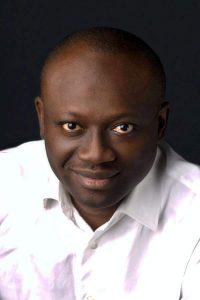How CAN Introduced Religious Variable into Nigeria’s Political Equation
By Simeon Kolawole
 Simeon Kolawole
Simeon Kolawole
How did we get here?
Before the late 1980s, religion was not a defining factor in national politics. Alhaji Shehu Shagari, elected president in 1979, was a Fulani Muslim surrounded by Christians. His No 2, Dr Alex Ekwueme, was an Igbo Christian. The No 3 was Dr Joseph Wayas, a Christian from today’s Cross River state who was senate president. The No 4 was Chief Edwin Ume Ezeoke, a Christian from today’s Anambra state who was Speaker. All the service chiefs were Christians: Lt Gen Alani Akinrinade (army chief, later defence chief); Lt Gen Sanda Jallo (Army Chief); Vice Admiral Akin Aduwo (Naval Chief); and AVM John Yisa-Doko (Air Chief). The Inspector General of Police was Mr Sunday Adewusi.
In fact, Chief Obafemi Awolowo, the presidential candidate of the Unity Party of Nigeria (UPN) in 1979, fielded a Christian-Christian, Southerner-Southerner ticket: Chief Philip Umeadi, from today’s Anambra state, was his running mate. Dr Nnamdi Azikiwe, candidate of the Nigeria Peoples Party (NPP), also did a Christian-Christian ticket, pairing with Dr Ishaya Audu from Kaduna state. Although Shagari’s Muslim-Christian pairing won the election with 5.6 million votes, the Christian-Christian tickets of Awolowo and Azikiwe did not do badly, netting 4.9 million and 2.8 million respectively. Awo and Zik got a total of 7.7 million votes. That was the Nigeria I grew up in as a primary school kid.
Military governments were not sold to the religious thing either. When Gen Yakubu Gowon, a Northern Christian, was Head of State, Vice Admiral Joseph Edet Akinwale Wey, the Chief of Staff, Supreme Headquarters, was his second-in-comman. The Vice-Chairman of the Federal Executive Council was Awolowo, the Minister of Finance. Effectively, Gowon’s military and civilian deputies were both Christians. Religion was of no consequence.
Maj-Gen Muhammadu Buhari and Brigadier (later Maj-Gen) Babatunde Idiagbon — both Fulanis, both Muslims, both Northerners — were No 1 and No 2 in 1983-85 and I can’t remember any objections. That was what Nigeria used to be.
Something definitely went wrong thereafter as religious crises erupted under Gen Ibrahim Babangida. When Bashorun MKO Abiola, a Yoruba Muslim, wanted to pick his deputy for the June 12, 1993 presidential election, we had lost our innocence. The Christian Association of Nigeria (CAN) warned him not to nominate a Muslim, otherwise Christians would not vote for him. They gave him a list of Northern Christians to pick from: Dr Chris Abashiya, Dr Ishaya Audu, Mr Bala Takaya and Mr Paschal Bafyau. These were no political heavy hitters. Abiola achieved the North-South balance by picking Amb Babagana Kingibe, albeit a Northern Muslim. They won nine of the 16 northern states.
The cold calculations in Tinubu’s camp, I should guess, were in favour of a Muslim running mate. And I suppose that these might be their essential assumptions. One, a Muslim-Muslim ticket should not be a problem for the Muslim North where the bulk of the votes are. It should be a major counter-offer to an Atiku presidency since the president and vice-president would be Muslims. Two, it should also not be a problem for the South-West, apart from the cosmopolitan Lagos. Tinubu is the homeboy and religion is not yet a major political factor, although CAN and Muslim Rights Concern (MURIC) are working overtime, along with fifth columnists, to poison Yorubaland with bitter bigotry.
Three, their calculation may be that those most likely to be vocally opposed to a Muslim-Muslim ticket are voters and commentators from the South-South, South-Eest and Christian North who do not vote for APC on a normal day. Even if Tinubu were a pastor, APC would still be a no-no for many voters in these constituencies.
by Simon Kolawole










